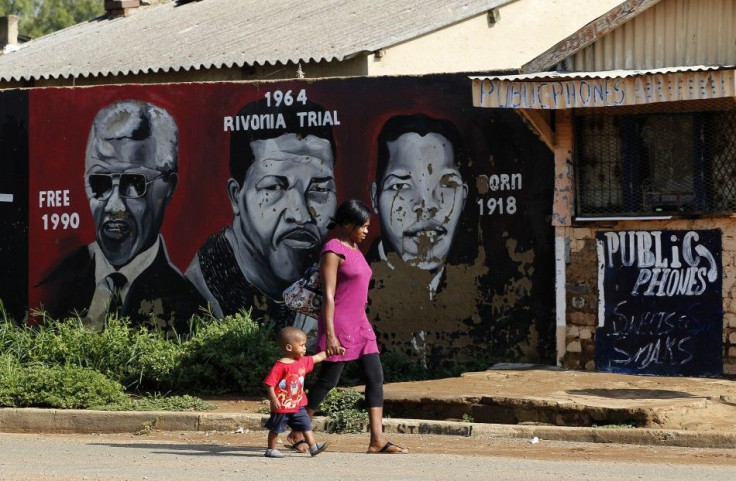Nyaope: Cheap Drug Cocktail Ravaging Black Townships of South Africa

In a nation already beleaguered by high rates of unemployment, poverty, HIV infection, violent crime and rape, the poor black underclass of South Africa is dealing with yet another crisis that is ravaging their communities – an epidemic involving a cheap drug cocktail comprising heroin, marijuana and other elements like rat poison, cleaning detergents and even crushed-up pills used in treatments of AIDS patients.
This bizarre drug mixture is called “nyaope” – which is extremely addictive like crack cocaine – and has been destroying the lives of youths in black townships like Soweto outside Johannesburg for about the past eight or nine years, according to reports in both European and South African media. The white powder also provides a very cheap high – about $2 per hit.
"I was studying but then I quit because of the drugs. I dropped out of school at 14," a 16-year-old female drug addict in Soweto named Thuli told BBC. Another nyaope user declared: "I must smoke this thing; it's our medication. We can't live without it. If I don't smoke, I will get sick.” Nyaope is primarily the drug of choice in Gauteng Province (which includes Soweto and Johannesburg). However, a similar drug cocktail called “whoonga” is found in the city of Durban in the province of KwaZulu-Natal.
Older addicts, who started out with softer drugs like marijuana, now say that teenagers are jumping in right into the harder stuff, like nyaope. Tragically, like most hard-core drug addicts, nyaope users must rely on theft, even from their own already-impoverished families and neighbors, to finance their debilitating habit. A 28-year former drug addict named Luthando Bulelani in the township of Springs, also near Johannesburg, explained to The Atlantic the toll of drug abuse in his community. "[Drug addicts] will use violence, rape, and [robbery] to get their hit,” he said. “If necessary they'll even kill. Some young men will become rent boys [gay escorts] or even turn to prostitution to feed their addiction." He added that nyaope has become an integral part of many township-dwellers’ daily lives – and rejects the notion that black South Africans are turning to cheap synthetic drugs for the same reason that youths in economically ravaged Greece are. “Nyaope is part of everyday culture in the townships. We're not in austerity, we're in poverty," he said.
Ironically, the South African government has yet to classify nyaope as an illegal substance, making it difficult for the courts to prosecute dealers and users. "It may sound like a volatile concoction, but it's not always known whether heroin is in a [nyaope] joint, or what is [in it] at all, and it's [therefore] harder to control. You can arrest someone on the assumption that they might be taking heroin, but you can't prosecute someone for a concoction of legal substances," Johanna Sehgume, a nurse and drug consultant in Duduza, Guateng, explained to The Atlantic.
Global Girl Media reported that the typical nyaope user is between the ages of 13 and 19, who have little money at their disposal and eager to experience the sudden rush and euphoria provided by the drug. The anti-Aids component of nyapoe is believed to deliver to the user a “hallucinogenic high.” There have been reports of drug addicts raiding HIV treatment facilities in order to steal the anti-retroviral drugs and even stories of AIDS patients selling their pills to desperate nyaope users.
Channel 4 News of Britain reported that there are at least “tens of thousands” of nyaope addicts across South Africa. In response to the growing crisis, the South African government said it will seek to deal with the problem by establishing more treatment centers. "[We are] funding a lot of non-profit organizations that are dealing with the drug issues," Lumka Oliphant, spokesperson for the state’s Department of Social Development, told BBC. "Our communication campaign has heightened, so people know the consequences of drugs and so that our children are educated, as they are the ones the drug dealers are targeting."
Existing treatment centers are already overwhelmed with people seeking help and woefully under-staffed and under-funded. "Soweto is a very big area and I have only four social workers," said Ananias Mbewe, director of the South African National Council on Alcoholism and Drug Dependence [Sanca] in Soweto. "If I had sufficient funds I'd be able to employ new social workers and to retain the ones I have, especially the young ones. We must join hands again substance abuse.”
South African youths who become entangled in drug addiction find themselves trapped in a nightmarish existence compounded by extremely high joblessness (as much as 60 percent in some townships), low education attainment and hopelessness leading to criminal activity. South African Police Services estimated that 60 percent of all crimes in the country are somehow linked to drugs. A drug dealer bragged to the Daily Maverick of South Africa: “They come from all over. These boys just love nyaope. Girls too, but girls are reluctant to come and buy for themselves so they prefer to send the boys. There are girls, however, who do not mind coming here to buy.”
Both Sehgume and Bulelani hope the government quickly classifies nyaope as an illegal drug. “Having a prosecution process in place means that it will be easier for addicts to seek treatment, as they can be referred to us by the police," the nurse said. Bulelani implored the government to act fast on pushing through changes in the law. "Nyaope is a killer,” he said. “In my eyes, the situation is worse than the current unemployment, HIV and AIDS crisis put together.”
© Copyright IBTimes 2024. All rights reserved.





















